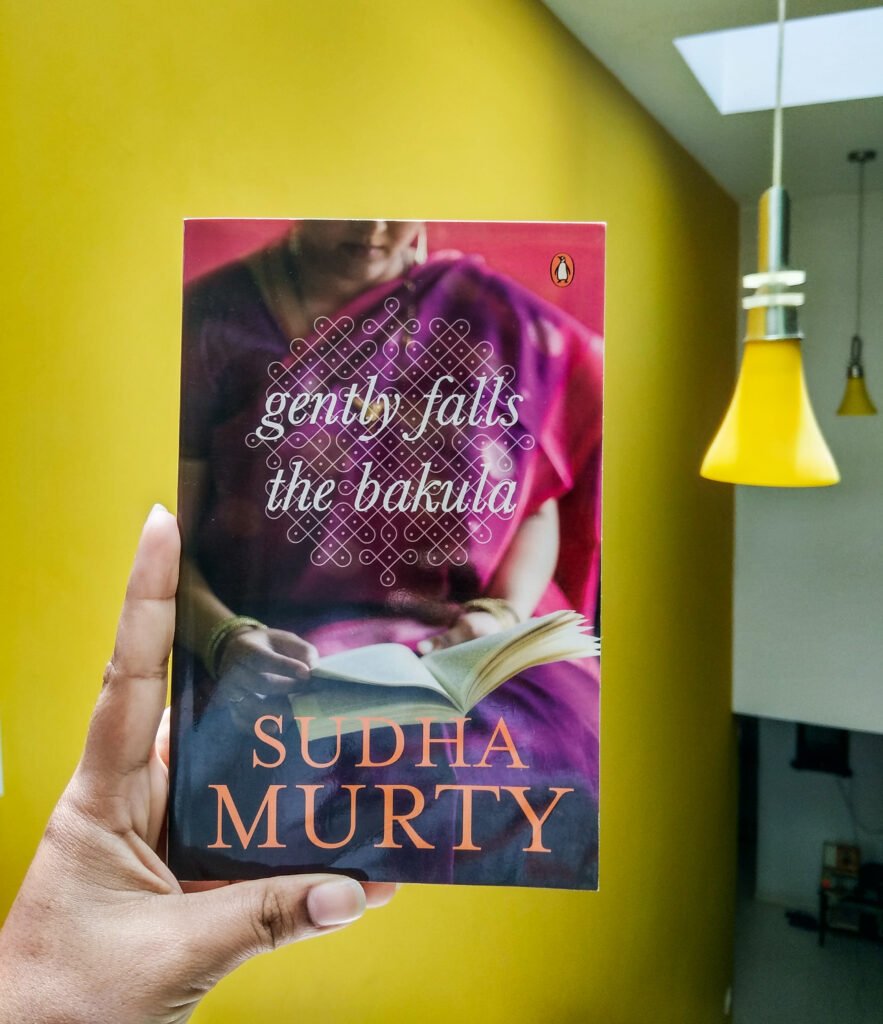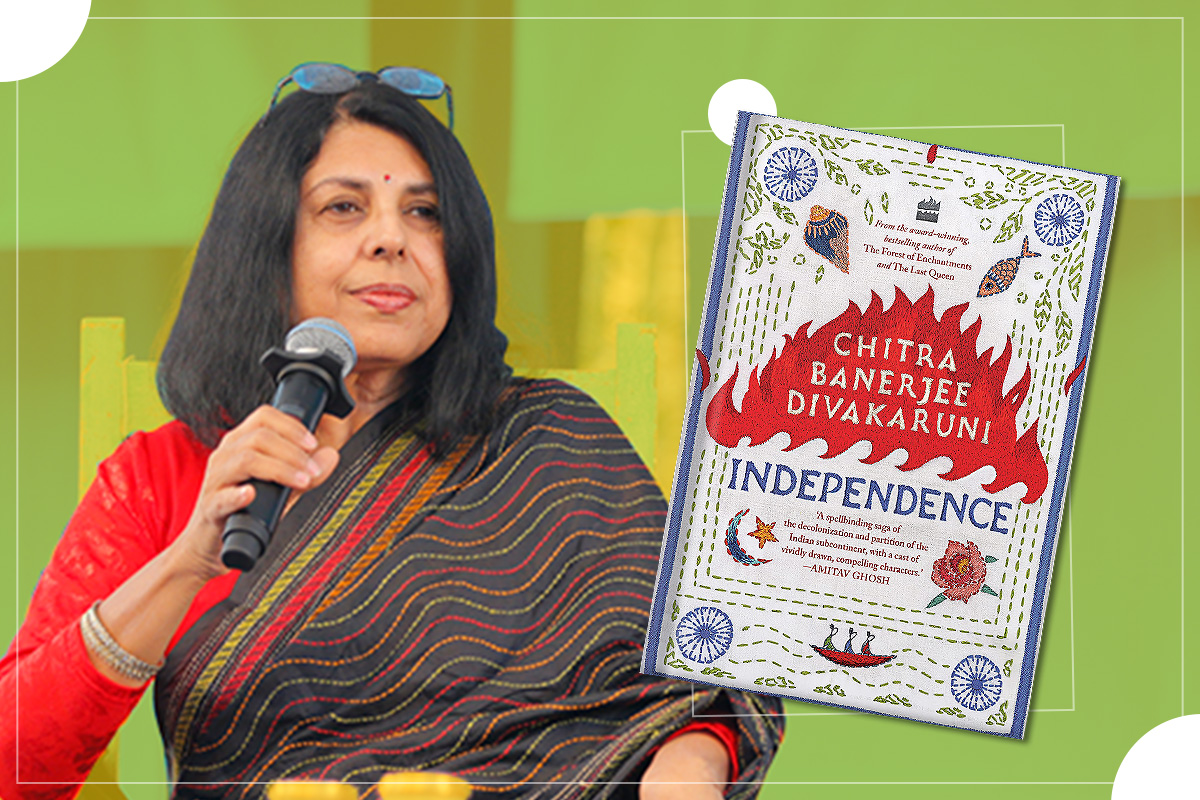Sudha Murthy, a prolific Indian writer in English and Kannada, is best known for her authentic representation of social, economic, and cultural philosophies as an upheaval of modern times. Gently Falls The Bakula, first published in the year of 2008, trails the story of a young, fledged woman and a bright student named Shrimati, set in the small town of Hubli and Bombay. Shrimati’s attraction toward Shrikant, the love between the two that hooks into marriage, and the sudden appraisal of Shrikant, a corporate officer who works relentlessly to achieve his goals, while Shrimati disowns her academic aspirations. She becomes uncomplaining, however, a silent cat that fulfils the duties of being the wife of a corporate leader.
In the meantime, meeting an old professor, Shrimati identifies to observe her downsides. She begins to realise her uncertainties and inopportune lifestyle. More than exploring the afterlife of Shrimati as a housemaker, the novel deconstructs the notion of male domination, divulging the female restraints in married life, the significance of decision-making without consultation of the partner in its association, and many more.
The book is a complete account of a simple and ordinary woman in Indian society who strives to get rid of her shattered environment surrounded by a busy partner, a bewildered mother-in-law, and many others. She is a woman in search of identity.
Sudha Murthy, a woman, pierces deeply into the inner mind of depressed women based on her feminine sensibility and psychological insight, as well as addressing the emotional imbalance of Indian women in a male-subjugated society.

Gently Falls The Bakula obliquely conveys the meek yearning of young, married women in the country. The novel tells the story of a young woman who embarks on a journey of self-discovery as she navigates the complexities of love and relationships. Through her experiences, she learns to trust herself and make her own choices, ultimately procuring her personal growth and fulfilment rather than relying on others to define the path in life. The novel emphasises the importance of personal attention, emotional independence, and self-procurement.
Also Read: Book Review: The Queen, The Courtesan, The Doctor, The Writer By Sabah Khan
Woman who writes women
Today, women writers have evolved socially and politically, raising fundamental queries regarding social practices, male supremacy, power structures, culture, and social institutions which are instrumental in marginalising women, states Dr B. Kathiresan and Dr P. Vasuki in The Representation of Women In Sudha Murthy’s Gently Falls The Bakula. Sudha Murthy is a feminist writer who opposes, at the same time addresses the customs, norms, and traditions of Indian society that consider women inferior to that of the man in the family. Instead of portraying women as submissive, weak, and meek, the characters in Sudha Murthy’s novel enlighten the stereotypical notion about women in society.

Murthy focuses on the upliftment of underprivileged communities in India and works in non-profit organisations as the chairperson of Infosys. She writes for women. Known for her philanthropic work and the effort to promote education and literacy among individuals, particularly among women and girls, she advocates for the rights of women, and gender equality, Murthy’s literary works often reflect the feminist ideologies that stand bright in Indian literature.
Women writers in the post-independence times followed the tradition established and sustained by men writers of an earlier generation. In Independence India till the 1960s the works of women writers mostly dealt with male domination and submissive role, “Feminist Consciousness In The Selected Novels Of Sudha Murthy And Manju Kapur” notes.
Having said that, Indian literature has a long history of depicting the lives and struggles of women, and feminism has been an imperative part of the literary tradition. Many writers such as Sudha Murthy have sightseen how women resist the forms of oppression to bring forward equivalence and empowerment. Similarly, by voicing the experiences of women through fiction and non-fiction, the writers have explored the theme of gender, sexuality, and identity, in which women writers play a vital role in addressing women’s issues in literature. They bring unique perceptions and involvement to the literary world that are often underrepresented in mainstream literature. It allows readers to gain subtle insight into women’s lives, as well as, shed light on specific experiences that they face which cannot be addressed by another gender.
Also Read: Book Review: Black River By Nilanjana S. Roy

Moreover, the works by women writers inspire and empower readers, particularly young women to interrogate and cast off the limiting gender roles that enact on them. Emphases on women particularly, portraying the struggles and sufferings of women’s social class in Indian patriarchal society, Sudha Murthy’s novel especially Gently Falls The Bakula, the book by heart highlights in articulating the tyranny of a young Indian woman allegedly.
Delicate as ‘Bakula’
The novel unfolds the tale of a marriage that failed due to a lack of time and communication between Shrimati and Shrikant. The phrase Gently falls the Bakula likely refers to the tree’s flowers falling or blooming gently or delicately. The flower Bakula stands for its beauty and incense which indirectly connects the relationship between Shrimati and Shrikant. In chapter four of the novel, Sudha Murthy describes the beauty of Bakula through the words of Shrimati, ‘the flower was neither as beautiful as a rose nor had the fragrance of jasmine or champaka. And yet, it was always special for him. It held an explicable attraction for him.‘
Bakula, a tree species native to India and Pakistan, is known for its fragrant, attractive white or pink flowers that bloom in the fall. The flower is often known for its medical properties, standout in landscaping and gardening, and many others.

Likely a metaphor used in a work of literature, such as a novel or play. In the novel by Sudha Murthy, Gently Falls The Bakula, the title procreates the substance of the relationship between the characters Shrikant and Shrimati through the symbolism of the Bakula flower. The Bakula symbolises the fragility or fleeting nature of the relationship between the couple as well as the beauty and passion they share. The imagery evokes a specific emotion or conveys a deeper meaning about the relationship between the characters.
In conclusion to the novel Gently Falls The Bakula, Shrimati opens up to Shrikant about her afflictions, puts an end to her solitude, rather desires to determine herself and attain freedom from the clasps of household anxiety. Bakula, as a token of love, gives off the fragrance of the love of a beloved. While Shrikant connects the flower Bakula to Shrimati for her love, it expresses the strange attraction between the two of them.
It deliberately extends the concept of eco-feminism through the character of Shrimati, connects to the Bakula flower, and closely associates with the personality of Shrimati, a young woman who falls in love with Shrikant. Her delicate character, the same as the flower Bakula covers magnificently in the book.
An exceptional feminist text
‘He always thought that his own life was much more significant than hers and his own will stronger. But now he stood disheartened without Shrimati‘, page 168, the novel concludes with the reader the realisation Shrikant possesses at the end for his cruelty in not providing Shrimati her due. Regretting his decision being busy building a better career of him with his domineering self he chose to avoid Shrimati in the marriage life. Dodged out of family pressure and putting Shrimati alone under mental pressure, the novel from a feminist perspective makes the reader understand the importance of communication, love, and compassion in a relationship.
Sudha Murthy’s works often focus on the lives of ordinary women and the struggles to break free from the constraints of traditional, sociocultural, and ethnic societal expectations. She captures the everyday lives and experiences of Indian women in her works and raises her voice by the means of writing.

Indian literature holds a rich tradition in feminist writing including various authors exploring the theme of gender, women empowerment, and the patriarchal structure of Indian society. Feminist writers such as Rashsundari Debi, Arundhati Roy, Anita Desai, Urvashi Butalia, and others kept overrated for years in which today, the novel, short stories, and children’s fiction by Sudha Murthy gets green in Indian English literature.
Notably, the novel Gently Falls The Bakula, considered a feminist text emphasises the wrangles and the importance of women’s empowerment and agency. The book is an exceptional feminist text as well as a rousing element of women’s writing in literature.





